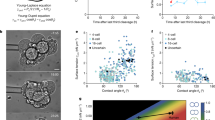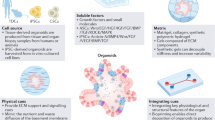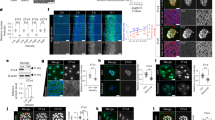Abstract
WHEN disaggregated mouse embryo cells are first cultivated in vitro, the cells grow into a confluent layer of fibroblasts on the bottom of the Petri dish, and then begin to grow additional layers on top of the first. If the cells are transferred, subsequent subcultures will show less tendency to form multiple layers. This effect is accompanied by a diminution in growth-rate of the cells and may be described as a progressive decrease in their growth potential. This behaviour is to be contrasted with that of L cells, an established cell line derived from mouse fibroblasts, which show no diminution in their growth potential upon transfer, and retain their ability to grow out of the monolayer.
This is a preview of subscription content, access via your institution
Access options
Subscribe to this journal
Receive 51 print issues and online access
$199.00 per year
only $3.90 per issue
Buy this article
- Purchase on Springer Link
- Instant access to full article PDF
Prices may be subject to local taxes which are calculated during checkout
Similar content being viewed by others
References
Abercrombie, M., Heaysman, J. E. M., and Karthauser, H. M., Exp. Cell Res., 13, 276 (1957).
Author information
Authors and Affiliations
Rights and permissions
About this article
Cite this article
GREEN, H., NILAUSEN, K. Repression of Growth of Mammalian Cells under Agar. Nature 194, 406–407 (1962). https://doi.org/10.1038/194406b0
Issue Date:
DOI: https://doi.org/10.1038/194406b0
Comments
By submitting a comment you agree to abide by our Terms and Community Guidelines. If you find something abusive or that does not comply with our terms or guidelines please flag it as inappropriate.



